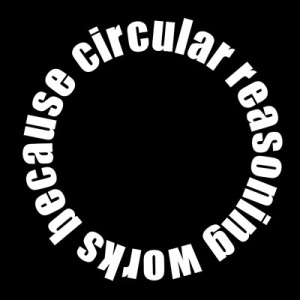Logic is a proper way of thinking. Norman Geisler writes that “Logic deals with the methods of valid thinking” (Geisler 1999, 427). Logical fallacies, then, are errors in the way one thinks or presents an argument. Logic and logical fallacies are important for everyone to know, but it is especially important for Christians to know since they are called to promote truth. Paul writes that the Christian should be in the practice of “laying aside falsehood, speak truth each one of you with his neighbor, for we are members of one another” (Ephesians 4:25, NASB). So, the Christian should know how to speak the truth and to avoid any fallacy of thinking. Unfortunately, many sites devoted to logic promote an atheist agenda. One might think that the atheist has a stranglehold on logic, but nothing further could be the case. Therefore, this article will provide 33 logical fallacies that every Christian, in fact every person, should know.
Ad Hominem: This fallacy means literally “against the man.” This is a classic debate tactic. Instead of attacking an argument’s validity, the debater will instead attack one’s opponent. For example: some atheists have attacked the character of William Lane Craig instead of dealing with Craig’s cosmological arguments. This is an ad hominem fallacy.
Ambiguity: The fallacy of ambiguity is used when the debater uses vague language that could be taken in a variety of ways. This is also known as someone speaking “out of both sides of one’s mouth.” Politicians are normally the worst culprits of this fallacy. When posed with a particular problem, the politician may claim that he or she may not have known about the issue when it is clear that the politician did. Or, it could be demonstrated by a politician presenting a bill without directly expressing the contents of the bill.
Anecdotal: The anecdotal fallacy is found when one uses one’s experience instead of a sound argument when making a case. For instance, one could argue that one person benefited from taking a particular medicine; therefore everyone should take that medicine. It could be that not everyone would benefit from that kind of medicine due to the differences in each person’s body. It is for this reason that the Christian should not only rely upon their experience with Christ when making a case for Christianity, but provide the evidence for Christianity in addition to providing one with their experience. If one relies only on their experience, one could be found guilty of committing the anecdotal fallacy.
Appeal to Authority: This fallacy is often used in the atheist community, but is often used in the theist community, as well. The appeal to authority fallacy is committed when one uses the beliefs of one in authority (scientist, archaeologist, theologian, philosopher, etc.) instead of dealing with the argument itself. It may be that the authority in question is correct. However, just because one is in authority does not make the authority figure correct. Consider the fact that at one time; most scientists and theologians believed that the world was flat. Thus, an appeal to authority would have been flawed in those days.
Appeal to Consequences: In this fallacy, one uses consequences without providing any real evidence that a consequence would follow the antecedent. Mothers forgive me. But this is normally used by mothers when they tell their children that if they do not eat their Brussel sprouts they will not grow up big and strong. It may be that the children will grow up big and strong without eating Brussel sprouts. The mother has not provided a clear link between the consumption of Brussel sprouts and growing up big and strong. (Note to children: I would not use this against your mothers or you may find yourself the victim of the appeal to force.)
Appeal to Emotion: This fallacy is found in the classic “guilt trip.” In this fallacy, the debater will manipulate an emotional response from the listener without providing any clear evidence for the debater’s claim. For instance, atheists will appeal to the atrocities performed by Christians as an argument against the resurrection of Christ. It could be that Christ has risen and that Christians have performed atrocious acts, but the atrocities do not deny the validity of Christ’s resurrection. Grandparents are good at the “appeal to emotion.” For instance, a grandmother may claim, “You never come see me. You must not love me anymore.” In fact, it could be that the grandchild loves the grandparent very much, but is not able to see the grandparent as they wish they could. Nonetheless, this is an appeal to emotion.
Appeal to Force: The appeal to force is also known by its Latin name argumentum ad baculum. This fallacy is found when a person, or institution, forces their beliefs upon another by issuing threats. The person or institution has not proven its case but forces others to believe by force. For instance: in certain regimes of the past, if one did not become an atheist and adhere to the government’s new system of control, the person could lose his/her occupation, could be ostracized, or could be executed.
Appeal to Nature: This fallacy claims that just because something is “natural” it must be good. For instance, some will argue that men are drawn to have multiple relationships with other many other women, so infidelity must be okay. One can find the falsehood in such a claim. Just because something comes “natural” does not make it right. Unfortunately, this fallacy is made by many trying to cover up their misdeeds.
Appeal to Novelty: This fallacy assumes that just because something is new that the thing, or idea, must be better. For instance, many believed that Windows Vista was going to be better than Windows XP because it was newer. It was later found that Windows XP was far better since Vista had many programming flaws. Therefore, just because something is new does not make it better unless it is demonstrated to be better.
Appeal to Poverty: This fallacy occurs when one assumes that just because a view is held by the poor that it must be true. This is the opposite of the appeal to wealth fallacy. It may be that most poor people believe that the government is oppressing them. The view may or may not be true. However, such a view cannot be accepted on the merits that the poor hold it without any other evidence.
Appeal to Tradition: This fallacy is the opposite of the appeal to novelty fallacy. In this fallacy, one holds that just because a viewpoint is old that it must be true. For instance, some Calvinists will hold that their view is true because it correlates with the view held by Augustine. It could be that the view is true. However, one cannot claim the accuracy of the view by its antiquity alone.
Appeal to Wealth: This fallacy is opposite of the appeal to poverty fallacy. In this fallacy, one holds a view as true because its adherents are wealthy. For instance, one might claim that Al Gore is correct about global warming because Gore is wealthy. The merits of global warming have nothing to do with the wealth of one of its advocates: Al Gore.
Bandwagon Fallacy: This fallacy is based upon an appeal to popularity. One claims that something is good based only on the fact that everyone else thinks that it is good. For instance a young lady may ask her parents if she can have her tongue pierced because all of her friends are piercing their tongues. The problem is that a view can be popular and be incorrect. Therefore, the bandwagon fallacy should be avoided.
Begging the Question/Circular Reasoning: Circular reasoning is performed when the conclusion is presented in the argument. For instance, a Christian may be asked, “How do you know that the Bible is true?” The Christian responds, “I know the Bible is true because the Bible says that it is true.” This is providing absolutely no evidence whatsoever. Such a form of defense should be wholeheartedly rejected.
Black or White: This fallacy is committed when only two options are presented when more options may be available. For instance, some claim that one can only have faith or reason. However, it can be that one can hold faith and reason.
Burden of Proof: This fallacy is committed when one assumes that they do not have to provide evidence for their claim and that the burden is upon the one trying to prove them wrong. For example, the atheist may desire to have 100% certainty that God exists in order to believe. Therefore, the atheist will declare that the Christian must provide this level of evidence or the Christian’s view is wrong, or vice versa. Therefore, it could be said that a person that desires more evidence than is necessary to believe/disbelieve.
Composition/Division: The composition fallacy assumes that what is true of a part is true of the whole. The division fallacy assumes that what is true of the whole is true of the parts. Someone might claim that since North Carolina has islands offshore and is one of the states of the United States of America, that all states in the United States of America must have islands offshore. This is impossible since many states are not aligned along an ocean. Therefore, this is the composition fallacy. Someone could also claim that since the United States is one nation, all the states of the nation must experience the same weather. This would be considered the division fallacy.
False Cause: This fallacy occurs when someone finds a correlation and assumes a cause. For instance, one may view a chart to find that the crime rate in a particular community is rising while the immigration rate in the community is also rising. One may assume that the immigration rise was causing the rise in crime. There may be other causes afoot than just the rise in immigration.
Gambler’s Fallacy: This fallacy has ties to Las Vegas. This fallacy occurs when one attributes a run of events to independent events. For instance, a gambler may claim to have a “run” on the roulette wheel. In fact, there is no run but a series of independent events. For instance, assuming that since 9 red cards have been consistently taken from a card deck that a black card will be drawn next is committing the gambler’s fallacy.
Genetic Fallacy: This fallacy is committed when one’s argument is considered good or bad only based upon the advocate’s ancestry. For instance, a theologian from Nigeria may not have his arguments taken seriously because he is dark-skinned and comes from a third world nation. The guilty party would have committed the genetic fallacy. Or, a Christian scientist may not have her experiment considered because she is a Christian. This is also a genetic fallacy.
Loaded Question: This fallacy is committed when one asks a question with a presumption built into it. This is performed in order to side-track the particular person in question. For instance, one may ask a Christian apologist, “Since a belief in God is primitive and superstitious, wouldn’t that make your arguments primitive and superstitious?” Or if one were to ask another, “Do you need help with your drug problem” when there is no evidence of a drug problem; this would be an example of a loaded question.
Middle Ground Fallacy: This fallacy assumes that a “middle ground” between two extremes is always true. Or, this fallacy can be conducted when assuming that a middle ground exists when it does not. For instance, some may try to find a middle ground in the debate on the existence of God. However, there are only two options: God exists or God does not exist. No middle ground can exist in such a case.
Moralistic Fallacy: This fallacy is the opposite of the appeal to nature fallacy. In this fallacy, one assumes that because something should be a certain way, something is that way. For instance, one may claim that all parents will take care of their children because all parents should take care of their children. Unfortunately, not all parents do take care of their children.
No True Scotsman: This fallacy is somewhat difficult to describe. To simplify, this fallacy avoids criticism by changing the dynamic of the argument so present the case unfalsifiable. The tenets are changed to avoid scrutiny. On http://yourlogicalfallacyis.com, a good example of this is presented, “Angus declares that Scotsmen do not put sugar on their porridge, to which Lachlan points out that he is a Scotsman and puts sugar on his porridge. Furious, like a true Scot, Angus yells that no true Scotsman sugars his porridge” (https://yourlogicalfallacyis.com/no-true-scotsman).
Personal Incredulity: This fallacy is committed when one passes off difficult concepts as inherently false because one does not understand the concept. For instance, Jimmy does not think that Thomism is a valid theological system because he does not understand the writings of Thomas Aquinas. Or, Betty does not believe in the distance of light-years because she cannot understand how light can travel at 186,000 miles per second. Therefore, a light-year must not exist.
Post Hoc Fallacy: This fallacy is committed when one assumes that things happen after an unrelated experience. For instance, athletes participate in certain rituals before they take the field. They believe these rituals will help them perform in the game. In reality, there is no correlation. Note: some sites have claimed that the efficacy of prayer is a post hoc fallacy. However, this claim is committing several fallacies including the anecdotal and black-or-white fallacy. The author who claims that prayer is superstitious is abiding by their own preconceived notions that God does not exist. If God does exist, then it is entirely logical to expect an answer to one’s prayer. It is just as logical as expecting a person on the other end of the telephone line to respond to one’s question. Beware of sites that promote a genetic fallacy in designating that people of faith are automatically wrong because they believe in the power of God.
Red Herring: The red herring fallacy came from fox hunters who sent out their dogs to chase foxes only to find that their dogs were distracted by red herrings (perhaps purposely placed by opposing hunters) which led them off the trail of the fox. This is a tactic used to get a person off their point. For instance: a Christian apologist is addressing the evidence for God’s existence. Someone then asks, “What about the crusades? Don’t the evil acts performed by the Crusaders in the name of God negate God’s existence?” Obviously, the Crusades have nothing to do with the plausibility of God’s existence.
Slippery Slope: This fallacy assumes that just because a person does one thing that the person will eventually do something else. For instance, some would claim that if one listens to rock music then one will become a delinquent. Or others assume if one reads any other translation other than the King James Version, one will become a flaming liberal. Obviously, the consequents do not proceed from the antecedents with the slippery slope fallacy.
Special Pleading: This fallacy is similar to the No True Scotsman fallacy. In this fallacy, one refuses to accept that one is wrong by inventing ways in which to hold to old notions. For instance, it has been demonstrated that the Alexandrian codex is a better than the Byzantium codex for use in translating the Bible. However, for those who desire to hold to the Byzantium texts, one will claim that the Alexandrian texts were modified by cults when there is no evidence to back up such a claim. If science demonstrates something to be true, one will claim that science is faulty. These are cases of special pleading.
Strawman: Strawman fallacies are among one of the more popular fallacies that are employed. This fallacy misrepresents someone’s argument to make the argument easier to attack. Unfortuately, this happens far more than this writer would like to imagine. For instance, Bill might claim that Sally is a tree-hugger because she believes in global warming. Or, Brent makes Hugh out to be a Darwinist because Hugh believes in an old-earth interpretation of Genesis. These are examples of the strawman fallacy.
The Fallacy Fallacy: This fallacy accuses a claim to be false because it is poorly argued or another fallacy has been committed. In other words, the claim is not evaluated on its own merits but by the way it was presented. Since Susan presented a poor presentation on the nutritional value of blueberries, Barbara believes that blueberries should never be eaten. Barbara has committed the fallacy fallacy.
The Texas Sharpshooter: This fallacy gets its name from a sharpshooter who shoots holes in a barn and then paints a bullseye around the majority of bullet holes (Richardson 2012, http://yourlogicalfallacyis.com). The person committing this fallacy will choose data that only suits his argument or presumption. For instance, a drug company may only choose positive data that supports a drug that they are promoting without considering the negative data. Or, Zane, a statistician, evaluates the educational systems of various states. He only chooses the best schools to evaluate in his state, while choosing the worst schools in other states, in order to demonstrate that his state’s educational system is better than any other system. Zane has committed the Texas Sharpshooter fallacy.
Tu Quoque: Pronounced (too-kwoo-kee), this person committing this fallacy turns criticism back upon the critic instead of dealing with the criticism itself. It’s also called “passing the buck.” For instance, Christine’s theory is challenged by Cassandra because of a mathematical error. Christine retorted, “Oh yeah, well your last theory had two mathematical errors in it and you didn’t hear me say anything about it.” In this case, Christine was guilty of the tu quoque fallacy because she did not deal with the criticism but instead dealt with the criticism by offering criticism.
Conclusion
One may find that they have engaged in these fallacies more than on one occasion. While these logical fallacies are certainly not the unpardonable sin, they should be avoided by the one promoting truth. The Christian’s faith is built upon fact and reality. The Christian has nothing to hide. Therefore, these fallacies should be avoided as much as possible. Remember the words of Paul, “Instead, speaking the truth in love, we will grow to become in every respect the mature body of him who is the head, that is, Christ” (Ephesians 4:15, NIV).
Bibliography
Geisler, Norman L. Baker Encyclopedia of Christian Apologetics, Baker Reference Library. Grand Rapids, MI: Baker Books, 1999.
Richardson, Jesse. (2012). http://yourlogicalfallacyis.com. Accessed July 28, 2014.
Scripture marked (NASB) comes from the New American Standard Bible. La Habra: Lockman, 1995.
Scripture marked (NIV) comes from the New International Version. Grand Rapids: Biblica, 2011.
Some information taken from www.logicalfallacies.info. Accessed July 28, 2014.
© Pastor Brian Chilton. 2014.

















[…] Source: 33 Logical Fallacies Everyone Should Know – BELLATOR CHRISTI […]
Thank you for sharing my post. Blessings!
Pastor Brian
[…] to ignorance’ or ‘argument from authority’, a full list can be found here, some of which may surprise you. What these ideas demonstrate is a detailed understanding of what […]
[…] Source: 33 Logical Fallacies Everyone Should Know – BELLATOR CHRISTI […]
Thank you for sharing my post. Blessings!
Pastor Brian
[…] to ignorance’ or ‘argument from authority’, a full list can be found here, some of which may surprise you. What these ideas demonstrate is a detailed understanding of what […]
Thank you for this very helpful article. As for the application during interactions with people, IMHO, a superior approach is to point out the error and why it is such without mentioning any permutation or subcategory of the word “fallacy.” The label prompts stubbornness from offense, whereas simply spelling things out offers the opponent the occasion to respond to reason or show themselves as smokescreen artists with ideology at the core. IMHO. And thank you again for the article.
Very well said. I fully agree. Often fallacy labels are thrown without engaging the content of one’s argument.
Thank you for this very helpful article. As for the application during interactions with people, IMHO, a superior approach is to point out the error and why it is such without mentioning any permutation or subcategory of the word “fallacy.” The label prompts stubbornness from offense, whereas simply spelling things out offers the opponent the occasion to respond to reason or show themselves as smokescreen artists with ideology at the core. IMHO. And thank you again for the article.
Very well said. I fully agree. Often fallacy labels are thrown without engaging the content of one’s argument.
Mike: That part of the process sounds like a part I wouldn’t be consciously aware of. Is “I don’t know how it happens” not an acceptable answer? I’m not even sure I/we really know things in the sense you think we do. Most of my knowledge I see as more of a “best guess” or a certain amount of confidence rather than a “I absolutely could not be wrong about this.”
“I don’t know how it happens” is not an acceptable answer because the naturalistic worldview excludes the possibility of knowledge. It gives you no basis for any confidence about any kind of knowledge. I did not claim that all knowledge must have absolute certainty. To say that something is probably true requires a lawful universe, which is an unjustified assumption if naturalism is true. To say that that you have a 50/50 chance of flipping a coin and getting heads, for example, assumes that the coin won’t change into a bird or something else. You’re experience gives you no basis for thinking that the future will be like the past because you have no experience of the future.
And yet the sun still rises every morning, whether I believe in the existence of a god or not.
The only way in order for the sun to rise and for you or I to be able to see it is attributed to God’s existence. His existence is a necessity as he is a necessary being.
As for the comment by A Friendly Atheist, the claim that an atheist merely lacks a belief in God and therefore has no burden of proof assumes that a person can be neutral about the existence of God. A person can be neutral about something like the existence of blue watermelons. He can simply lack a belief in blue watermelons because he hasn’t seen any evidence for them. That lack of belief doesn’t do much to impact his life. (Although we can imagine scenarios where it would force a choice, like if he were a watermelon seller and a customer demands that he order blue watermelons for her to purchase.) But things are different when you are dealing with ultimate commitments rather than watermelons. Specifically, the Christian idea of God is different because this kind of God (unlike deities of Greek mythology, I should point out) rules over every area of life, and thus makes demands in every area of life. There is no area of neutrality any place in the universe. All facts are God-created facts and God-interpreted facts. A person who lacks a belief in God has chosen to reject God’s interpretation of facts with every fact that he confronts. Unlike some non-ultimate fact like the color of watermelons, the atheist must unavoidably act on a positive belief about ultimate reality that replaces the theistic view. That alternative belief is usually naturalism these days. (Platonic idealism is another choice.) The atheist has the burden of defending the view that naturalism can better account for things like knowledge and ethics than theism does.
Then there is the Scriptural claim that everyone knows that God exists; some people merely refuse to acknowledge it and suppress that knowledge (Romans 1:18-21).
I’m not terribly interested in debating, and I imagine Pastor Brian probably isn’t too interested in having us get into it on here. I am curious however, about where exactly god comes into play with “all facts.” At what point(s) exactly is/was god involved in my understanding of the fact that I have two feet?
Thank you for your kind way of responding. To address why theists believe that God should be accepted: I will write on some of those issues in the upcoming articles in the weeks ahead. I am scheduled to write an in depth defense for the Kalam cosmological argument. So stay tuned.
Blessings,
Pastor Brian
Knowledge that you have two feet requires a unity behind all the diversity of sense impressions. That requires an absolute mind that created the individual facts of the world. While the existence of God provides a basis for the possibility of knowledge, secular epistemology is bankrupt. It has been unable to explain how knowledge is possible. That’s basically what postmodernism acknowledges – that modernism (a.k.a. scientific empiricism) was a failure. You’re right that this is not the place to fully debate this, but you can see my essay on the issue here: http://www.christianciv.com/ChristCivEssay.htm.
BTW, thanks for the list of logical fallacies, Brian.
Thanks Mike for helping the Pastor illustrate the “special pleading fallacy” by suggesting that the “god question” is immune to the normal process of reasoning!
It’s disappointing that many theists do not seem to appreciate the perspective of non-believers in regard to the burden of proof. Let me try to put it simply…
My experience of the world is what it is. On a given day I wake up and interact with the world around me, which goes about its business according to whatever rules it obeys, regardless of what I believe or care about. I don’t need to postulate anything existential in order to function. In this regard, I am non-believer in many things. Here are just a few examples: a-Mars-ist, a-bigfoot-ist, a-north pole-ist, and of course, a-theist. Why? Because I do not experience any of these things in a way that I can recognize. I don’t interact with Mars or the North Pole, for example. They might exist, they might not exist, but I have no cause to presume them. “Non-belief” may not even be a good way to describe this perspective, but that’s the word we use.
Now, someone comes along and says “Mars exists.” Nothing changes once he makes that statement. I have no more reason to believe it once he says it, even if it’s true. If he actually wants to convince me that Mars exists, he bears the entire burden to make the case. Not only have I not presumed a position on Mars, I did not likely even have a concept of “Mars” until the person identifies Mars in a way that I can evaluate.
God is the same exact thing. Regardless of whether a deity exists, I do not recognize it for existing and don’t even have a concept of what it might be. How can a non-believer have any burden of proof?
Incidentally, for an atheist to bear a burden of proof would mean that he would have to identify God in order to disprove it. This makes no sense. In fact, a theist would then be entirely justified in accusing such an atheist of creating a straw man.
Cheers!
-TGM
TGM, thank you for your comment. I respectfully disagree with your ontological assessment pertaining to the existence of God. I agree with noted philosopher Alvin Plantiga in that God’s existence is a warranted, or basic, belief. God’s existence is the only explanation for the existence of anything, consciousness, the laws of nature, physics, the structure of the universe, and the intricacies of life. This is so much so that agnostic philosopher Thomas Nagel admitted that naturalism is incapable of answering the intricacies of life, especially human consciousness. Atheist Anthony Flew became a theist due to the power of the teleological and cosmological arguments. Thus, God’s existence is a necessity that demands that the burden of proof lies with the atheist, much as it would lie with one who rejected the existence of Mars after seeing it in a telescope. However, I would also argue that it is up to both sides to argue their case. Blessings.
My argument was not an example of the special pleading fallacy because when I made the exception to how we reason about most things, I also justified making the exception. Your reply shows no recognition of the justification that I offered, much less an attempt to refute it. Understanding the nature of God changes how you view everything else in life, and the non-existence of God undermines the justification for believing anything else in life, particularly that the world about you obeys rules and that there are rules of logic.
If you really don’t have any concept of what God might be, then you can’t say that it is exactly like anything else or different from anything else, even whether it is different from you non-belief. Basically, you can’t use the word in any meaningful way. Yet you know more than you care to admit since you distinguish God from your non-belief.
That’s a good point Mike. The qualification of “God” exemplifies the knowledge of what “God” must be, just as the description used of “Mars.” Mars is a knowable entity as it describes a planetary body.
Thank you both for your feedback. Always appreciated. Let me try to reply to you both, in turn, and in brevity so as to avoid trespassing beyond the boundaries of this article’s topic.
Pastor, if you wish to adopt the position that belief in a deity is basic, you may do so, though I feel it to be unjustified. But the larger problem is that you seem to be confusing what one believes about what is, with what actually is. The burden of proof (the subject of my original comment) is entirely about the former. It could be perfectly true that God’s existence is necessary, but it does not follow that belief in God is necessary, or that we necessarily intuit “God”. I must return to the example of the nonbeliever who simply does not know what you are talking about when you say “God” and is thus incapable of having belief. It seems to me that you have come full circle in bearing the burden to demonstrate the existence of God, either evidentially or basically.
Mike, I don’t accept the distinction you try to make between God and watermelons, partly addressed in comments to the pastor. Here are two places where I think you go wrong:
“A person who lacks a belief in God has chosen to reject God’s interpretation of facts…” This statement equates the lack of something with the rejection of the same something. I cannot square that logic.
Also “the atheist must unavoidably act on a positive belief about ultimate reality that replaces the theistic view.” Not quite so. Everyone acts in accordance with his experience but is not obligated to have any opinion about some ultimate reality in order to do so.
In closing, may I ask why you both felt inclined to bring up naturalism? Many theists conflate atheism with naturalism. This puzzles me. I don’t know why you think that atheists cannot believe in anything supernatural. We just don’t believe in a deity.
Warmly,
TGM
First of all, thank you TGM for your graciousness and tact in your responses. It is much appreciated. Let me try to offer a response to my portion of your rebuttal. I’ll let Mike offer his response.
It seems that we are crossing somewhat the balance of epistemology (how something is known) with ontology (knowing that something is). But the nature of your comment seems that some integration may be necessary. Ontologically, you used in your first response the existence of the planet Mars (assuming you were using the term to express the existence of the planet instead of the Roman god of war). It is clearly evident that Mars exists. One can see the planet through a telescope. One can send rovers to the planet. Thus, one must accept the existence of Mars though one has never stepped foot on the planet. Another good example is the distance “used to be planet” Pluto. NASA received some stunning pictures of the celestial body, though the images are blurred. We can know that such a body exists though we have not physically touched the body. The same seems to apply with God. Now, I know your first reaction, “Ah, but we cannot see God!” However, for the billions throughout the centuries who have encountered God in a personal way, the burden of proof lies with the unbeliever to discount all of such encounters…especially since they have occurred with people of different walks, different places, and different educational backgrounds. As I previously noted, God’s existence is demanded especially with the cumulative case stemming from the cosmological argument, teleological argument, kalam cosmological argument, Nagel’s demonstration of the problem of consciousness, the existence of miracles throughout the centuries, the resurrection of Christ, and countless other cases that clearly demonstrate God’s existence.
Now, is belief in God necessary? Well, that depends on what you mean by “necessary.” If one is searching for the truth and desires to know the truth, then the answer is yes. If one desires to see the purpose of human life, animal life, and the environment around us, then the answer again is affirmative. (Note: atheism leads to nihilism and this is affirmed by Nietzsche and many modern atheists). But, if you mean by “necessary” that belief in God will help you pay taxes or buy chicken nuggets at McDonalds, then no.
As a side note, be sure to check out my article “30 Abbreviated Arguments for the Existence of God” right here at PastorBrianChilton.wordpress.com. I have provided the link below.
https://pastorbrianchilton.wordpress.com/2013/10/21/30-abbreviated-arguments-for-the-existence-of-god/
Blessings,
Pastor Brian
TGM, there are two ways that a person can have a knowledge of God: innate and acquired. If God exists, an innate knowledge of God in every person would be expected. And the Bible happens to teach this. The second way is that the knowledge of God could be an obvious logical implication of the world in which we live. If God made the world, that would be expected as well. And the Bible happens to teach it as well. You keep bringing up the example of a person without the mental capacity to understand basic human language, so that he can’t even understand the concept of God. You appeal to this example as if it would relieve you of responsibility for knowing God. Yet your communication here clearly proves that that example does not apply to you. The mentally incapacitated person would have the innate knowledge of God, but not the acquired.
You say, “Everyone acts in accordance with his experience.” It is that very experience, every single fact in every moment of experience, that entails the existence of God so clearly that any person of normal intelligence is responsible for the knowledge of God acquired in this way. Even if you don’t believe this, you should recognize the possibility and how it affects the idea of burden of proof. Because God is the creator of all facts, He can be known through any fact. Even if you don’t believe this, you should see how God’s nature as a sovereign creator makes a difference here, in contrast to limited things like watermelons.
As to naturalism, I don’t see a contrast between belief in naturalism and belief in some kind of supernaturalism. You might believe in a finite god like Zeus, who performs various miracles in your life. But Zeus was born from parents (the Titans), who came into existence from pre-existing material forces. Because your hypothetical belief system includes an ultimately material, impersonal universe from which all things are produced, then your Zeus faith is also a naturalistic faith. As I see it, there are only two basic beliefs, 1) an absolute God who ultimately determines all things, and 2) naturalism, even if there are some finite gods running around in that world.
In the spirit of this post I wish to use what I have just learned
Mike said [As for the comment by A Friendly Atheist, the claim that an atheist merely lacks a belief in God and therefore has no burden of proof assumes that a person can be neutral about the existence of God. A person can be neutral about something like the existence of blue watermelons. He can simply lack a belief in blue watermelons because he hasn’t seen any evidence for them. That lack of belief doesn’t do much to impact his life. (Although we can imagine scenarios where it would force a choice, like if he were a watermelon seller and a customer demands that he order blue watermelons for her to purchase.)]
Mike Said [But things are different when you are dealing with ultimate commitments rather than watermelons.]
Please define “ultimate commitments”
Mike Said [Specifically, the Christian idea of God is different because this kind of God (unlike deities of Greek mythology, I should point out) rules over every area of life, and thus makes demands in every area of life.]
Burden of Proof (please provide proof that god rules over every area of life, if so it can it be detected or tested?), Appeal to Novelty
Mike Said [There is no area of neutrality any place in the universe. ]
How do you know that?
Mike said [All facts are God-created facts and God-interpreted facts.
A person who lacks a belief in God has chosen to reject God’s interpretation of facts with every fact that he confronts.]
I think you need to define what god is to you. For instance is god personal and effects you life every day, did he create the universe and the rules for it and leave?
Mike Said [Unlike some non-ultimate fact like the of watermelons, the atheist must unavoidably act on a positive belief about ultimate reality that replaces the theistic view.]
Strawman (“”atheist belief is a positive belief”, you assume that the belief is positive and not a negative)
Mike Said [That alternative belief is usually naturalism these days. (Platonic idealism is another choice.)
Strawman/red herring – atheist is not a belief it is a lack of belief due to insufficient evidence, you can’t honestly say that because you don’t believe in Santa Clause you must believe (insert alternate belief here) then.
Mike Said [The atheist has the burden of defending the view that naturalism can better account for things like knowledge and ethics than theism does.]
Burden of Proof/red herring (IE you must defend your position that Santa Clause does not exist to better account for things like knowledge and ethics, again atheist do not see enough evidence to prove that god equals knowledge and ethics it is a lack in belief)
Mike Said [Then there is the Scriptural claim that everyone knows that God exists; some people merely refuse to acknowledge it and suppress that knowledge (Romans 1:18-21).]
Begging the Question/Circular Reasoning
Ultimate commitment: what you believe about the ultimate source of existence, knowledge and ethics (metaphysics, epistemology, ethics).
I do not assume that all beliefs are positive, just that everyone has some positive beliefs.
What kind of god do I believe in? Already answered: one that created and rules over every area of life. To be more specific the Calvinist view.
[you can’t honestly say that because you don’t believe in Santa Clause you must believe (insert alternate belief here) then.] This is exactly the fallacy of false analogy that I was warning against with the blue watermelon example. Like blue watermelons, Santa is a finite entity, so his non-existence has no consequences regarding the ultimate source of existence, knowledge and ethics. A sovereign Creator and Ruler of all things does have consequences for every area of life, such as how we judge what is true or false, real or imaginary.
I would answer your other questions in detail, but you keep making circular arguments. You say that atheists do not see enough evidence to prove God, but how you view evidence and what counts as evidence is a product of your non-belief in God, which is exactly what I was talking about regarding non-neutrality. You have positive beliefs about the nature of knowledge that assume the non-existence of God.
Regarding my making note of the biblical claim that everyone knows God even if they suppress that knowledge, that is not begging the question because I did not claim to offer a proof that you suppress the knowledge of God simply by quoting the Bible. I was merely pointing out your own question begging by your claim that you lack a belief in God. You only lack a belief in God if in fact God does not exist. Therefore claiming to lack a belief in God is begging the question of God’s non-existence. Of course, you may offer evidence against the reasonableness of believing in God (which you haven’t done, although you keep mentioning some kind of evidence that you have considered), in which case your claim of atheism might not be begging the question. But then, your claims about the evidence cannot beg the question of atheism either, if your conclusion of atheism is to be sound.
As for the comment by A Friendly Atheist, the claim that an atheist merely lacks a belief in God and therefore has no burden of proof assumes that a person can be neutral about the existence of God. A person can be neutral about something like the existence of blue watermelons. He can simply lack a belief in blue watermelons because he hasn’t seen any evidence for them. That lack of belief doesn’t do much to impact his life. (Although we can imagine scenarios where it would force a choice, like if he were a watermelon seller and a customer demands that he order blue watermelons for her to purchase.) But things are different when you are dealing with ultimate commitments rather than watermelons. Specifically, the Christian idea of God is different because this kind of God (unlike deities of Greek mythology, I should point out) rules over every area of life, and thus makes demands in every area of life. There is no area of neutrality any place in the universe. All facts are God-created facts and God-interpreted facts. A person who lacks a belief in God has chosen to reject God’s interpretation of facts with every fact that he confronts. Unlike some non-ultimate fact like the color of watermelons, the atheist must unavoidably act on a positive belief about ultimate reality that replaces the theistic view. That alternative belief is usually naturalism these days. (Platonic idealism is another choice.) The atheist has the burden of defending the view that naturalism can better account for things like knowledge and ethics than theism does.
Then there is the Scriptural claim that everyone knows that God exists; some people merely refuse to acknowledge it and suppress that knowledge (Romans 1:18-21).
Thanks Mike for helping the Pastor illustrate the “special pleading fallacy” by suggesting that the “god question” is immune to the normal process of reasoning!
It’s disappointing that many theists do not seem to appreciate the perspective of non-believers in regard to the burden of proof. Let me try to put it simply…
My experience of the world is what it is. On a given day I wake up and interact with the world around me, which goes about its business according to whatever rules it obeys, regardless of what I believe or care about. I don’t need to postulate anything existential in order to function. In this regard, I am non-believer in many things. Here are just a few examples: a-Mars-ist, a-bigfoot-ist, a-north pole-ist, and of course, a-theist. Why? Because I do not experience any of these things in a way that I can recognize. I don’t interact with Mars or the North Pole, for example. They might exist, they might not exist, but I have no cause to presume them. “Non-belief” may not even be a good way to describe this perspective, but that’s the word we use.
Now, someone comes along and says “Mars exists.” Nothing changes once he makes that statement. I have no more reason to believe it once he says it, even if it’s true. If he actually wants to convince me that Mars exists, he bears the entire burden to make the case. Not only have I not presumed a position on Mars, I did not likely even have a concept of “Mars” until the person identifies Mars in a way that I can evaluate.
God is the same exact thing. Regardless of whether a deity exists, I do not recognize it for existing and don’t even have a concept of what it might be. How can a non-believer have any burden of proof?
Incidentally, for an atheist to bear a burden of proof would mean that he would have to identify God in order to disprove it. This makes no sense. In fact, a theist would then be entirely justified in accusing such an atheist of creating a straw man.
Cheers!
-TGM
TGM, thank you for your comment. I respectfully disagree with your ontological assessment pertaining to the existence of God. I agree with noted philosopher Alvin Plantiga in that God’s existence is a warranted, or basic, belief. God’s existence is the only explanation for the existence of anything, consciousness, the laws of nature, physics, the structure of the universe, and the intricacies of life. This is so much so that agnostic philosopher Thomas Nagel admitted that naturalism is incapable of answering the intricacies of life, especially human consciousness. Atheist Anthony Flew became a theist due to the power of the teleological and cosmological arguments. Thus, God’s existence is a necessity that demands that the burden of proof lies with the atheist, much as it would lie with one who rejected the existence of Mars after seeing it in a telescope. However, I would also argue that it is up to both sides to argue their case. Blessings.
My argument was not an example of the special pleading fallacy because when I made the exception to how we reason about most things, I also justified making the exception. Your reply shows no recognition of the justification that I offered, much less an attempt to refute it. Understanding the nature of God changes how you view everything else in life, and the non-existence of God undermines the justification for believing anything else in life, particularly that the world about you obeys rules and that there are rules of logic.
If you really don’t have any concept of what God might be, then you can’t say that it is exactly like anything else or different from anything else, even whether it is different from you non-belief. Basically, you can’t use the word in any meaningful way. Yet you know more than you care to admit since you distinguish God from your non-belief.
That’s a good point Mike. The qualification of “God” exemplifies the knowledge of what “God” must be, just as the description used of “Mars.” Mars is a knowable entity as it describes a planetary body.
Thank you both for your feedback. Always appreciated. Let me try to reply to you both, in turn, and in brevity so as to avoid trespassing beyond the boundaries of this article’s topic.
Pastor, if you wish to adopt the position that belief in a deity is basic, you may do so, though I feel it to be unjustified. But the larger problem is that you seem to be confusing what one believes about what is, with what actually is. The burden of proof (the subject of my original comment) is entirely about the former. It could be perfectly true that God’s existence is necessary, but it does not follow that belief in God is necessary, or that we necessarily intuit “God”. I must return to the example of the nonbeliever who simply does not know what you are talking about when you say “God” and is thus incapable of having belief. It seems to me that you have come full circle in bearing the burden to demonstrate the existence of God, either evidentially or basically.
Mike, I don’t accept the distinction you try to make between God and watermelons, partly addressed in comments to the pastor. Here are two places where I think you go wrong:
“A person who lacks a belief in God has chosen to reject God’s interpretation of facts…” This statement equates the lack of something with the rejection of the same something. I cannot square that logic.
Also “the atheist must unavoidably act on a positive belief about ultimate reality that replaces the theistic view.” Not quite so. Everyone acts in accordance with his experience but is not obligated to have any opinion about some ultimate reality in order to do so.
In closing, may I ask why you both felt inclined to bring up naturalism? Many theists conflate atheism with naturalism. This puzzles me. I don’t know why you think that atheists cannot believe in anything supernatural. We just don’t believe in a deity.
Warmly,
TGM
First of all, thank you TGM for your graciousness and tact in your responses. It is much appreciated. Let me try to offer a response to my portion of your rebuttal. I’ll let Mike offer his response.
It seems that we are crossing somewhat the balance of epistemology (how something is known) with ontology (knowing that something is). But the nature of your comment seems that some integration may be necessary. Ontologically, you used in your first response the existence of the planet Mars (assuming you were using the term to express the existence of the planet instead of the Roman god of war). It is clearly evident that Mars exists. One can see the planet through a telescope. One can send rovers to the planet. Thus, one must accept the existence of Mars though one has never stepped foot on the planet. Another good example is the distance “used to be planet” Pluto. NASA received some stunning pictures of the celestial body, though the images are blurred. We can know that such a body exists though we have not physically touched the body. The same seems to apply with God. Now, I know your first reaction, “Ah, but we cannot see God!” However, for the billions throughout the centuries who have encountered God in a personal way, the burden of proof lies with the unbeliever to discount all of such encounters…especially since they have occurred with people of different walks, different places, and different educational backgrounds. As I previously noted, God’s existence is demanded especially with the cumulative case stemming from the cosmological argument, teleological argument, kalam cosmological argument, Nagel’s demonstration of the problem of consciousness, the existence of miracles throughout the centuries, the resurrection of Christ, and countless other cases that clearly demonstrate God’s existence.
Now, is belief in God necessary? Well, that depends on what you mean by “necessary.” If one is searching for the truth and desires to know the truth, then the answer is yes. If one desires to see the purpose of human life, animal life, and the environment around us, then the answer again is affirmative. (Note: atheism leads to nihilism and this is affirmed by Nietzsche and many modern atheists). But, if you mean by “necessary” that belief in God will help you pay taxes or buy chicken nuggets at McDonalds, then no.
As a side note, be sure to check out my article “30 Abbreviated Arguments for the Existence of God” right here at PastorBrianChilton.wordpress.com. I have provided the link below.
https://pastorbrianchilton.wordpress.com/2013/10/21/30-abbreviated-arguments-for-the-existence-of-god/
Blessings,
Pastor Brian
TGM, there are two ways that a person can have a knowledge of God: innate and acquired. If God exists, an innate knowledge of God in every person would be expected. And the Bible happens to teach this. The second way is that the knowledge of God could be an obvious logical implication of the world in which we live. If God made the world, that would be expected as well. And the Bible happens to teach it as well. You keep bringing up the example of a person without the mental capacity to understand basic human language, so that he can’t even understand the concept of God. You appeal to this example as if it would relieve you of responsibility for knowing God. Yet your communication here clearly proves that that example does not apply to you. The mentally incapacitated person would have the innate knowledge of God, but not the acquired.
You say, “Everyone acts in accordance with his experience.” It is that very experience, every single fact in every moment of experience, that entails the existence of God so clearly that any person of normal intelligence is responsible for the knowledge of God acquired in this way. Even if you don’t believe this, you should recognize the possibility and how it affects the idea of burden of proof. Because God is the creator of all facts, He can be known through any fact. Even if you don’t believe this, you should see how God’s nature as a sovereign creator makes a difference here, in contrast to limited things like watermelons.
As to naturalism, I don’t see a contrast between belief in naturalism and belief in some kind of supernaturalism. You might believe in a finite god like Zeus, who performs various miracles in your life. But Zeus was born from parents (the Titans), who came into existence from pre-existing material forces. Because your hypothetical belief system includes an ultimately material, impersonal universe from which all things are produced, then your Zeus faith is also a naturalistic faith. As I see it, there are only two basic beliefs, 1) an absolute God who ultimately determines all things, and 2) naturalism, even if there are some finite gods running around in that world.
In the spirit of this post I wish to use what I have just learned
Mike said [As for the comment by A Friendly Atheist, the claim that an atheist merely lacks a belief in God and therefore has no burden of proof assumes that a person can be neutral about the existence of God. A person can be neutral about something like the existence of blue watermelons. He can simply lack a belief in blue watermelons because he hasn’t seen any evidence for them. That lack of belief doesn’t do much to impact his life. (Although we can imagine scenarios where it would force a choice, like if he were a watermelon seller and a customer demands that he order blue watermelons for her to purchase.)]
Mike Said [But things are different when you are dealing with ultimate commitments rather than watermelons.]
Please define “ultimate commitments”
Mike Said [Specifically, the Christian idea of God is different because this kind of God (unlike deities of Greek mythology, I should point out) rules over every area of life, and thus makes demands in every area of life.]
Burden of Proof (please provide proof that god rules over every area of life, if so it can it be detected or tested?), Appeal to Novelty
Mike Said [There is no area of neutrality any place in the universe. ]
How do you know that?
Mike said [All facts are God-created facts and God-interpreted facts.
A person who lacks a belief in God has chosen to reject God’s interpretation of facts with every fact that he confronts.]
I think you need to define what god is to you. For instance is god personal and effects you life every day, did he create the universe and the rules for it and leave?
Mike Said [Unlike some non-ultimate fact like the of watermelons, the atheist must unavoidably act on a positive belief about ultimate reality that replaces the theistic view.]
Strawman (“”atheist belief is a positive belief”, you assume that the belief is positive and not a negative)
Mike Said [That alternative belief is usually naturalism these days. (Platonic idealism is another choice.)
Strawman/red herring – atheist is not a belief it is a lack of belief due to insufficient evidence, you can’t honestly say that because you don’t believe in Santa Clause you must believe (insert alternate belief here) then.
Mike Said [The atheist has the burden of defending the view that naturalism can better account for things like knowledge and ethics than theism does.]
Burden of Proof/red herring (IE you must defend your position that Santa Clause does not exist to better account for things like knowledge and ethics, again atheist do not see enough evidence to prove that god equals knowledge and ethics it is a lack in belief)
Mike Said [Then there is the Scriptural claim that everyone knows that God exists; some people merely refuse to acknowledge it and suppress that knowledge (Romans 1:18-21).]
Begging the Question/Circular Reasoning
Ultimate commitment: what you believe about the ultimate source of existence, knowledge and ethics (metaphysics, epistemology, ethics).
I do not assume that all beliefs are positive, just that everyone has some positive beliefs.
What kind of god do I believe in? Already answered: one that created and rules over every area of life. To be more specific the Calvinist view.
[you can’t honestly say that because you don’t believe in Santa Clause you must believe (insert alternate belief here) then.] This is exactly the fallacy of false analogy that I was warning against with the blue watermelon example. Like blue watermelons, Santa is a finite entity, so his non-existence has no consequences regarding the ultimate source of existence, knowledge and ethics. A sovereign Creator and Ruler of all things does have consequences for every area of life, such as how we judge what is true or false, real or imaginary.
I would answer your other questions in detail, but you keep making circular arguments. You say that atheists do not see enough evidence to prove God, but how you view evidence and what counts as evidence is a product of your non-belief in God, which is exactly what I was talking about regarding non-neutrality. You have positive beliefs about the nature of knowledge that assume the non-existence of God.
Regarding my making note of the biblical claim that everyone knows God even if they suppress that knowledge, that is not begging the question because I did not claim to offer a proof that you suppress the knowledge of God simply by quoting the Bible. I was merely pointing out your own question begging by your claim that you lack a belief in God. You only lack a belief in God if in fact God does not exist. Therefore claiming to lack a belief in God is begging the question of God’s non-existence. Of course, you may offer evidence against the reasonableness of believing in God (which you haven’t done, although you keep mentioning some kind of evidence that you have considered), in which case your claim of atheism might not be begging the question. But then, your claims about the evidence cannot beg the question of atheism either, if your conclusion of atheism is to be sound.
Great list, I’m glad to see it posted. I can’t tell you how exhausting it is to see people make the same mistakes over and over.
(Sorry for replying to my own comment, looks like I can’t edit it)
I would like to point out one thing, which is that the example for the Burden of Proof doesn’t seem to fit with the definition. The definition is about who needs to provide the proof, while the example is talking about certainty. The Burden of Proof applies to anyone who is making a positive claim. “There is a God” is such a claim, and I think “there is/are no god(s)” would also be such a claim. In that case, both sides would need to present proof. In my experience though, most religious debates tend to be between a theist who claims a god exists and an agnostic atheist who simply lacks a belief in any gods. In this case, the Burden of Proof is solely on the theist.
As for certainty of the proof, I’m not entirely sure how that works or if it’s even well defined. If 100% or near certainty can’t be achieved, you may just have to go until the other person is convinced. That’s certainly how it feels, at least.
Interesting point. There is debate on both sides about who bears the “burden of proof.” I will refrain from commenting about who bears the greatest burden in this regard. But, I would agree that both sides need to thoroughly present their case.
“[…] and I think “there is/are no god(s)” would also be such a claim.” – Then you are wrong (and contradicting yourself).
Let me know if you need help to identify why that’s the case…
Thanks for the kind words.
Brian: Greetings in the Lord – may I humbly offer the following to your article.
1. I endorse this article. Any teaching that assists us to think, reason, speak, and explain the Truth of God with better logic and clarity for our hearers, will extend His kingdom. But it also acts to bring better understanding of God’s Word within us. Not that it is ever “our ability” that acts to lead a lost soul to God – that will always be the work of God.
2. I wish now to point out a technical error within the article text:
To speak of fallacies as “logical fallacies” is grammatically incorrect. This is because, when someone has said or written something that is a “fallacy” then, clearly, their reasoning was flawed – even though THEY perceived it to be right. So, flawed logic PRODUCES “fallacies.” (As you rightly state, they “are errors in the way one thinks or presents an argument.”)
Correct reasoning IS “logical” – and so, it will not produce a “fallacy.”
The problem lies in the fact that real fallacies are “logical” – but only to those whose reasoning is faulty. And that is why it is incorrect to say “logical fallacies.”
Test this out by replacing your “logical fallacies” words with: “errors of logic” – especially in the article title. For the others you can do the same, or else, simply take out the word “logical.” Give this a try; I am sure it will help you to see that it makes more sense.
Holy Spirit of God give us Your understanding.
Thank you for the feedback. You brought forth good and worthy critiques.
Blessings,
Pastor Brian
Awesome. Adding it to my list of Essential Student Resources.
That’s great. I am glad this article was useful. Blessings.
Brian,
“For instance, it has been demonstrated that the Alexandrian codex is a better than the Byzantium codex for use in translating the Bible.”
What?
I’m not sure what your question is.
[…] You can see these logical fallacies here. […]